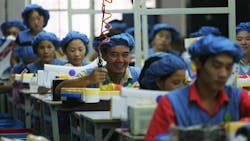Surge in China Factory-gate Prices Fans Inflation Hopes
Chinese factory-gate prices climbed for a fifth straight month in January, the government said February 14, fueling hopes the world's biggest goods trader can export much-needed inflation to the global economy.
The surge, as well as a pick-up in consumer inflation, is the latest sign a slowdown in the Asian giant could be coming to an end, although the outlook is clouded by concerns that Donald Trump will press ahead with a protectionist agenda.
The producer price index (PPI) hit 6.9%, according to the National Bureau of Statistics (NBS), well up from December's 5.5% and outstripping forecasts of 6.5% in a Bloomberg News survey.
Consumer prices rose 2.5%, slightly above estimates.
An increase in global crude prices boosted prices in oil and natural gas exploitation, which contributed to the expansion, NBS analyst Sheng Guoqing said.
While the increase in commodities prices, as well as Lunar New Year spending, helped the increase, PPI has been rising since September when it snapped a four-year streak of declines.
With China being the world's leading trader, a pick-up in prices would filter through to the global economy, which has been mired in tepid inflation or deflation for years.
Weak inflation is bad for industrial prospects and economic growth because customers delay purchases in hopes of yet-cheaper deals in the future, starving companies of business and funds.
China "will contribute positively to global inflation" this year, Brian Jackson of IHS Global Insight told AFP. But its impact on prices will be blunted by the weakness of the yuan, he added.
The readings were the latest in a positive series of figures for the world's number two economy.
Data showed last week that exports and imports surged more than expected in January, while manufacturing activity also continued to grow.
Financial Risks
That came after news that economic growth picked up in the final three months of 2016, although over the year the GDP growth rate was the slowest for more than a quarter of a century.
But there are concerns about possible future trade tensions as Trump settles into the White House. He has promised to declare China a currency manipulator and threatened to slap punitive tariffs on its goods.
However, some of those fears eased after Trump told China's President Xi Jinping Friday that he would retain Washington's existing "One China" policy, an about-turn from his previous position that it was up for negotiation.
"Not all is going to be positive news from China this year," said Jackson of IHS. The automotive and real-estate sectors would be "big negatives" due to changing government policies, he added.
Consumer and producer prices are expected to peak soon, as "the base effects that have boosted inflation in recent months are soon going to go into reverse", Julian Evans-Pritchard of Capital Economics said in a note.
Beijing's move to tighten monetary policy and cool down the retail property market would also "keep broader price pressure contained over the medium-term", he added.
The central bank's recent moves to reduce liquidity show that leaders are "mindful of financial risks", particularly in real estate and other sectors, ANZ economist Betty Wang said in a note.
But the economy is not yet solid enough and authorities should be cautious about aggressive tightening, she added.
Infrastructure investment is likely to continue as local officials "are keen to deliver decent growth figures" with a major Communist Party Congress later this year, Zhou Hao of Commerzbank AG said, according to Bloomberg News.
Copyright Agence France-Presse, 2017
About the Author
Agence France-Presse
Copyright Agence France-Presse, 2002-2025. AFP text, photos, graphics and logos shall not be reproduced, published, broadcast, rewritten for broadcast or publication or redistributed directly or indirectly in any medium. AFP shall not be held liable for any delays, inaccuracies, errors or omissions in any AFP content, or for any actions taken in consequence.
